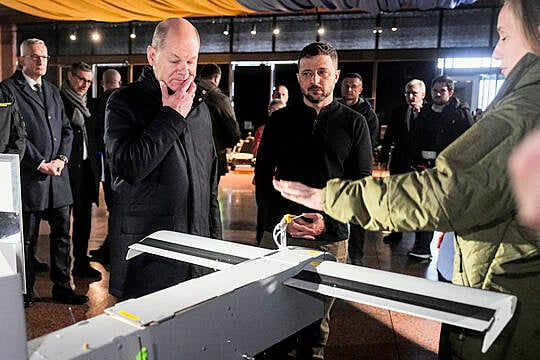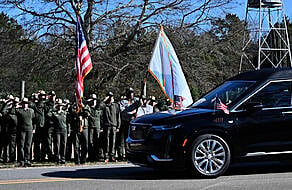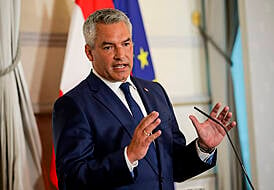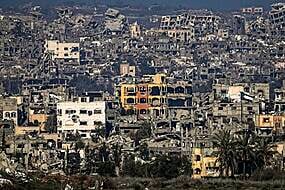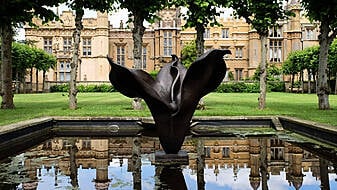German Chancellor Olaf Scholz is visiting Ukraine for the first time in more than two years, where he vowed to keep supporting Kyiv throughout the war.
His arrival comes just weeks after he was criticised by Ukrainian President Volodymyr Zelensky for having a phone call with Russian President Vladimir Putin.
Their call came at a time of widespread speculation about what the new administration of US President-elect Donald Trump will mean for Ukraine.
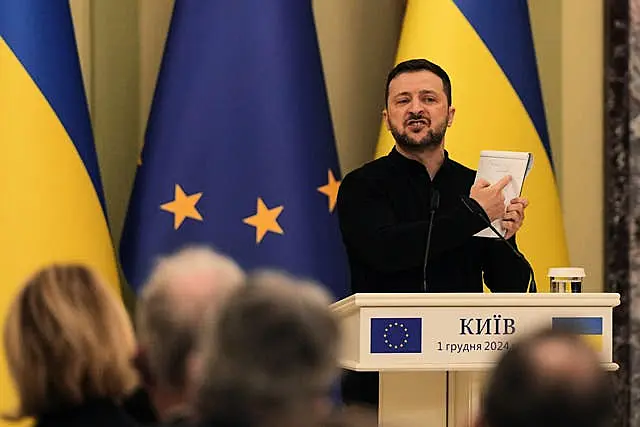
Ukraine is sensitive to whether cracks might be appearing in the unity of its Western allies to keep helping it against Russia, as Putin banks on outlasting the West’s commitment to Ukraine.
With the war soon to enter its fourth year, Mr Zelensky said he disagreed with Mr Scholz’s call with Mr Putin. The Ukrainian leader said it could prompt phone calls with other leaders, possibly reducing Mr Putin’s international isolation and legitimising his full-scale invasion of Ukraine.
Mr Scholz, meanwhile, defended the call, explaining he wanted to remind Mr Putin that Ukraine is a sovereign and independent state that should be able to decide its own future. He also stressed that he conveyed to Mr Putin that Ukraine is not alone and that its partners will continue their support.
Germany is Ukraine’s second-largest backer after the United States and a vociferous supporter, but Mr Scholz has refused to budge on two of Mr Zelensky’s key requests: supplying German- and Swedish-made Taurus long-range missiles to Ukraine and inviting it to join Nato quickly.
Mr Scholz, who faces an early election in February, has cast his refusal to send Taurus missiles as part of a “prudent” approach to the conflict that assures Ukraine of strong support without taking the risk of the war escalating into a conflict between Nato and Russia.

“This doesn’t lessen our support, which is very wide-ranging and – it is important for me to say – will remain wide-ranging,” Mr Scholz said in Kyiv.
In a major shift, Mr Zelensky signalled that an offer of Nato membership to territory under Kyiv’s control could end “the hot stage of the war” in Ukraine.
Mr Scholz has been cautious about talk of fast-tracking Nato membership for Ukraine. In recent months, he has emphasised the importance of finding a path to peace, while stressing that it must not be chosen over Ukraine’s head.
Mr Scholz said that, in his meeting with Mr Zelensky, he will announce further military supplies this month totalling 650 million euros (£539 million).
Today, during negotiations with the leadership of European institutions, we focused on strengthening our air defense, implementing all existing agreements on defense support, and discussing in detail how to achieve greater progress next year in Ukraine’s EU membership… pic.twitter.com/jkIxvzY5m1
Advertisement— Volodymyr Zelenskyy / Володимир Зеленський (@ZelenskyyUa) December 1, 2024
“Ukraine can rely on Germany – we say what we do and we do what we say,” he said.
“I would like to make clear here on the ground that Germany will remain Ukraine’s strongest supporter in Europe.”
Mr Scholz’s visit comes ahead of an early German election expected in February. As the campaign gets under way, the Chancellor has pointed to Germany’s status as Ukraine’s second-biggest weapons supplier while also highlighting his “prudence” in working to prevent the war from escalating and refusing to deliver Taurus long-range cruise missiles.
The German leader was criticised by Mr Zelenskyy in November for speaking to Mr Putin in what appeared to be the first conversation with the sitting leader of a major Western power in nearly two years.
In that call, Mr Scholz urged Mr Putin to be open to negotiations with Ukraine but the Russian leader said any peace deal should acknowledge Russia’s territorial gains and security demands, including that Kyiv renounce joining Nato.

Mr Zelensky suggested the call to Mr Putin risked opening “a Pandora’s box” and would only serve to make Russia less isolated. He travelled to Berlin in October to meet Mr Scholz to drum up support for his “victory plan” to end the war in Ukraine on a tour of European capitals.
The plan included a suggestion that Ukraine receive a formal invitation to join Nato and a request that Kyiv be given permission to use long-range Western missiles to strike at military targets inside Russia.
Western nations granted permission for Kyiv to carry out long-range strikes with their weapons in November.
Following the decision, Mr Putin said Russia launched a strike on Ukraine with an unstoppable intermediate-range ballistic missile dubbed the Oreshnik. It marked the first time that such a missile was used in the war or in any other conflict.
